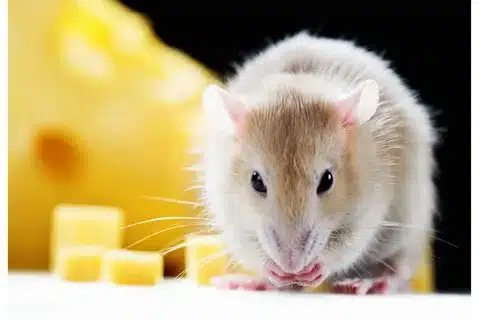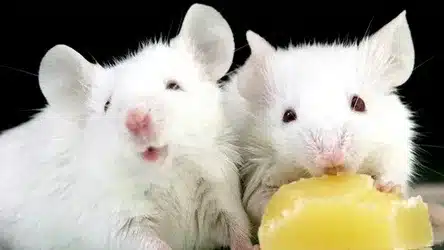Introduction
Do Rats Like Cheese: The idea that rats have an inherent affinity for cheese is a common stereotype perpetuated in popular culture. This association has been popularized in cartoons, movies, and folklore, often depicting rats as sneaky cheese enthusiasts. However, in reality, the preference of rats for cheese is quite different from the stereotype.
Rats are omnivorous creatures with a diverse diet. While they can eat cheese and may be attracted to its scent, it’s important to understand that cheese alone is not a staple or preferred food source for rats. In fact, rats have specific dietary needs for proper nutrition, and a diet consisting primarily of cheese would not provide all the essential nutrients they require for their health and well-being.
We will delve deeper into the dietary rats habits, shedding light on their preferences, nutritional needs, and dispelling the myth that they have an exclusive love for cheese.

Can I give my rats cheese?
In fact, cheese is seen as just another food by most rats. Although rats can eat cheese in small amounts, it’s not always the healthiest food to give to your rodent buddy. Feeding them too much cheese can lead to tummy problems.
Feeding Rats Cheese: Considerations and Guidelines: Feeding cheese to pet rats is a topic of interest for many rat owners, as rats are often portrayed as cheese enthusiasts in popular culture. While cheese can be offered to rats, it’s essential to do so in moderation and with consideration of their nutritional needs.
Occasional Treat: Cheese should be treated as an occasional treat for pet rats rather than a dietary staple. Rats have specific dietary requirements, including a balanced intake of proteins, carbohydrates, and vitamins, which cheese alone cannot provide.
Nutritional Content: Cheese is high in fat and protein, making it a calorie-dense food. While this can be beneficial for supplementing a rat’s diet, excessive consumption can lead to obesity and health issues.
Variety in Diet: Rats benefit from a diverse diet that includes fresh fruits, vegetables, grains, and lean protein sources. Offering a range of foods ensures they receive all necessary nutrients.
Watch for Allergies: Some rats may be lactose intolerant, so monitor for any signs of digestive upset or diarrhea when introducing cheese. If your rat shows sensitivity to dairy, it’s best to avoid cheese altogether.
Serving Size: Offer small, bite-sized pieces of cheese as an occasional treat. Avoid feeding them large quantities at once.
What is a rat’s favorite food?
Fruit and berries — Out of all the foods rodents consume, their top two loves are generally fruits and berries. In the wild, rats and mice consume these foods at every opportunity. Therefore, raspberry and blackberry bushes — as well as apple and pear trees — can serve as magnets for the animals.
Rat’s Favorite Foods: Understanding Their Preferences: Rats are highly adaptable and opportunistic creatures, which means they have a wide-ranging diet and can consume a variety of foods. While they don’t have a singular favorite food, they do exhibit preferences for certain types of items.
Grains: Grains are a staple in a rat’s diet. Rats particularly enjoy foods like rice, oats, wheat, and barley. These grains provide essential carbohydrates and energy.
Fruits and Vegetables: Rats have a sweet tooth and appreciate fruits like apples, bananas, and berries. They also enjoy vegetables such as carrots, broccoli, and leafy greens. These items offer vitamins and fiber.
Lean Proteins: Rats need protein for muscle development, and they may favor lean protein sources like cooked chicken or turkey, as well as insects like mealworms or crickets.
Nuts and Seeds: Rats often enjoy nuts and seeds like almonds, sunflower seeds, and pumpkin seeds. These provide healthy fats and protein.
Dairy Products: While not all rats are lactose intolerant, some may enjoy yogurt, cheese, or milk in small quantities.
Treats: Rats have a penchant for treats, such as small amounts of chocolate, peanut butter, or flavored rat treats available in pet stores. These should be given sparingly due to their high sugar or fat content.
Is cheese a rat’s Favorite food?
Rats will eat and enjoy cheese, like they enjoy other food types, but it’s not they favorite food by any means. The myth that rats particularly like cheese is no more than a myth.
Is Cheese a Rat’s Favorite Food? Debunking the Myth: The idea that cheese is a rat’s favorite food is a misconception that has persisted in popular culture for decades. While it’s true that rats have occasionally been depicted as cheese enthusiasts in cartoons and stories, this stereotype is far from accurate in reality.
Omnivorous Diet: Rats are omnivorous creatures with a diverse diet. They are opportunistic feeders and will consume a wide range of foods based on availability and nutritional value. Their diet in the wild includes grains, fruits, vegetables, and various protein sources.
Dietary Needs:
Rats have specific dietary requirements for proper health and nutrition. Their diet should be balanced and include a mix of carbohydrates, proteins, vitamins, and minerals. Cheese alone does not fulfill all these needs.
Moderation is Key: While rats may eat cheese if offered, it should only be given in moderation as an occasional treat. Cheese is high in fat and protein, and excessive consumption can lead to health issues, including obesity.
Individual Variability: Just like humans, individual rats may have different food preferences. While some rats may show interest in cheese, others may not be particularly drawn to it.
What is a rat’s Favorite cheese?
Contrary to popular belief perpetuated by cartoons and cultural folklore, rats don’t have a specific inclination towards cheese, although they can eat it. Being omnivores, rats have a wide-ranging diet and they prefer to consume foods high in carbohydrates and sugars, such as fruits, grains, and nuts.
Rats and Cheese: Preferences and Considerations: While rats are known to consume cheese, they don’t have a specific favorite type of cheese. Rats are opportunistic feeders, and their food preferences can vary depending on availability and individual taste. However, when considering offering cheese to pet rats, there are some important considerations to keep in mind.
Mild Cheeses: Rats generally prefer milder cheeses over strongly flavored ones. Mild cheeses like mozzarella, Swiss, or cheddar are often better received by rats.
Low Salt Content: Rats are sensitive to salt, so it’s advisable to offer low-sodium or unsalted cheese to avoid potential health issues related to excessive salt intake.
Freshness: Fresh cheese is preferred over aged or hard cheeses. Rats may find softer cheeses more palatable and easier to nibble on.
Small Portions: Offer cheese to rats in small, manageable portions. Cheese is calorie-dense and high in fat, so it should be considered an occasional treat rather than a dietary staple.
Monitor for Sensitivity: Some rats may be lactose intolerant, which can lead to digestive upset. Monitor your rats for any adverse reactions when introducing cheese to their diet.
What is a rat’s Favorite treat?
Some of a rat’s favorite treats include: Seeds. Sweets. Bread.
Rat’s Favorite Treats: A World of Options: Rats are known for their love of treats, and while they don’t have a single favorite, there are several types of treats that tend to be particularly enticing to these clever and curious rodents.
Fruits: Many rats have a sweet tooth and relish fruits like apples, bananas, grapes, and berries. The natural sugars in fruits make them an attractive treat.
Vegetables: Rats enjoy a variety of vegetables, such as carrots, broccoli, peas, and leafy greens. These provide essential vitamins and fiber.
Nuts and Seeds: Nuts like almonds, walnuts, and seeds such as sunflower seeds and pumpkin seeds are high in healthy fats and protein, making them appealing to rats.
Yogurt Drops: These specially formulated treats are designed for small animals like rats and come in various flavors. They can be a favorite among pet rats.
Mealworms: Dried mealworms are an excellent source of protein and are often appreciated by rats as a high-value treat.
Store-Bought Rat Treats
Commercially available rat treats made specifically for rodents can also be a hit. These treats come in various flavors and shapes.
Can my rats drink milk?
Rats can drink tiny amounts of milk as long as it’s not the full fat milk and a bit of yogurt is good for them too, In my opinion fairtrade yogurt is the best because it can be less fatty for them.
Can Rats Drink Milk: The question of whether rats can drink milk is a common one, often influenced by the portrayal of mice and rats in popular culture enjoying milk. However, the reality is more nuanced.
Lactose Intolerance: Most adult mammals, including many humans, become lactose intolerant to some degree as they age. Rats are no exception. Many adult rats are lactose intolerant, meaning they lack the enzyme lactase required to digest lactose, the sugar found in milk.
Young Rats: Young rats, like young mammals of many species, can typically digest milk without issue. In the wild, they would nurse from their mothers, who produce milk specifically tailored to their young. In this context, milk is a suitable source of nutrition for baby rats.
Caution with Adult Rats: While some adult rats may tolerate small amounts of milk, it’s generally not advisable to offer it to them. Consumption of milk by lactose-intolerant rats can lead to digestive upset, including diarrhea and stomach discomfort.
Safer Alternatives: If you want to provide a liquid treat or supplement for adult rats, consider offering lactose-free milk or small amounts of yogurt, which contains beneficial probiotics and is often better tolerated.
What is poisonous to rats?
Onions and garlic contain compounds that can damage rats’ red blood cells, leading to anemia and other health problems. Citrus fruits can cause digestive upset and liver damage if consumed in large amounts. Grapes and raisins can cause kidney failure in rats. Chocolate and alcohol are also toxic to rats.
Toxic Substances: What’s Poisonous to Rats: Rats are hardy creatures, but they can be susceptible to various toxic substances that are harmful or lethal to them. Understanding what is poisonous to rats is essential for their safety and well-being.
Rat Poisons (Rodenticides): Ironically, rat poisons are among the most dangerous substances for rats. These products are specifically designed to kill rodents and can be lethal if ingested by rats. Both anticoagulant and non-anticoagulant rodenticides are harmful to rats.
Toxic Foods: Rats should not consume certain human foods, such as chocolate, caffeine, alcohol, and sugary or salty snacks. These can lead to various health issues, including poisoning.
Plants: Some common household plants can be toxic to rats if ingested. Examples include philodendrons, poinsettias, and azaleas. It’s crucial to keep potentially toxic plants out of reach.
Certain Medications: Some medications intended for humans or other pets can be harmful to rats. Always consult a veterinarian for appropriate treatment if your rat is sick.
Insecticides and Cleaning Products: Chemicals found in insecticides and cleaning products can be toxic to rats if they come into contact with them or ingest residue. Keep these substances safely stored away from rat-accessible areas.
Heavy Metals: Rats are sensitive to heavy metals like lead and zinc, which can be present in contaminated food, water, or materials in their environment. Inhaling or ingesting these metals can lead to poisoning.
Is onion toxic to rats?
To use onions as a rat poison, you want to avoid cooking them; they are only poisonous to rats when they’re raw. Consuming onions causes instant anemic symptoms in rats and deprives their cells of oxygen. Large quantities of onion will cause kidney failure and can kill an adult rat within 12 hours.
Onions and Rats: A Toxic Combination: Onions are a common household ingredient known for their culinary versatility, but they can be toxic to rats. Here’s what you need to know:
Toxic Component: Onions contain compounds called thiosulfates, primarily found in their bulbs, that can be harmful to rats. These thiosulfates can lead to oxidative damage to a rat’s red blood cells, potentially causing a condition known as hemolytic anemia.
Symptoms of Toxicity: If rats consume a significant amount of onions, they may exhibit symptoms such as weakness, lethargy, loss of appetite, labored breathing, and discoloration of the mucous membranes (usually a pale blue or gray color).
Severity Varies: The severity of onion toxicity in rats depends on the quantity consumed and the individual rat’s sensitivity. Some rats may experience only mild symptoms, while others can develop severe health issues.
Avoid Feeding Onions: As a responsible rat owner, it is advisable to avoid feeding onions or any onion-containing foods to your pet rats. This includes cooked dishes that contain onions, as the toxic compounds are not destroyed by cooking.
Safe Alternatives: Instead, provide your rats with a balanced diet consisting of rat pellets, fresh fruits, vegetables (excluding onions and garlic), and lean protein sources to ensure their nutritional needs are met without the risk of toxicity.

Conclusion
The notion that rats have an intrinsic liking for cheese is largely a misconception perpetuated by cultural stereotypes. While rats are known to be opportunistic feeders and may consume cheese if it’s available, it is not their preferred or natural dietary choice. Rats are omnivorous animals with a varied diet that includes grains, fruits, vegetables, and protein sources like insects. They require a balanced diet to meet their nutritional needs.
Furthermore, it’s essential to recognize that cheese alone is not a suitable food source for rats as it lacks essential nutrients and can lead to health issues if fed in excess. Providing a well-rounded diet that caters to their nutritional requirements is crucial for keeping pet rats or managing rat populations in urban environments.
In summary, while rats may nibble on cheese if given the opportunity, they are not cheese connoisseurs by nature. Understanding their dietary habits and offering a nutritionally balanced diet is essential for their health and well-being.





No Comments